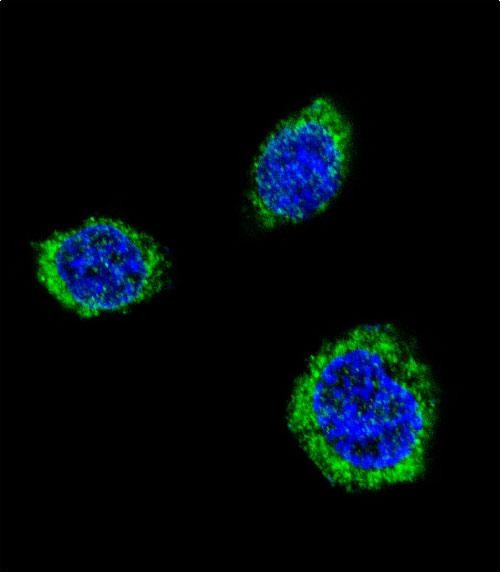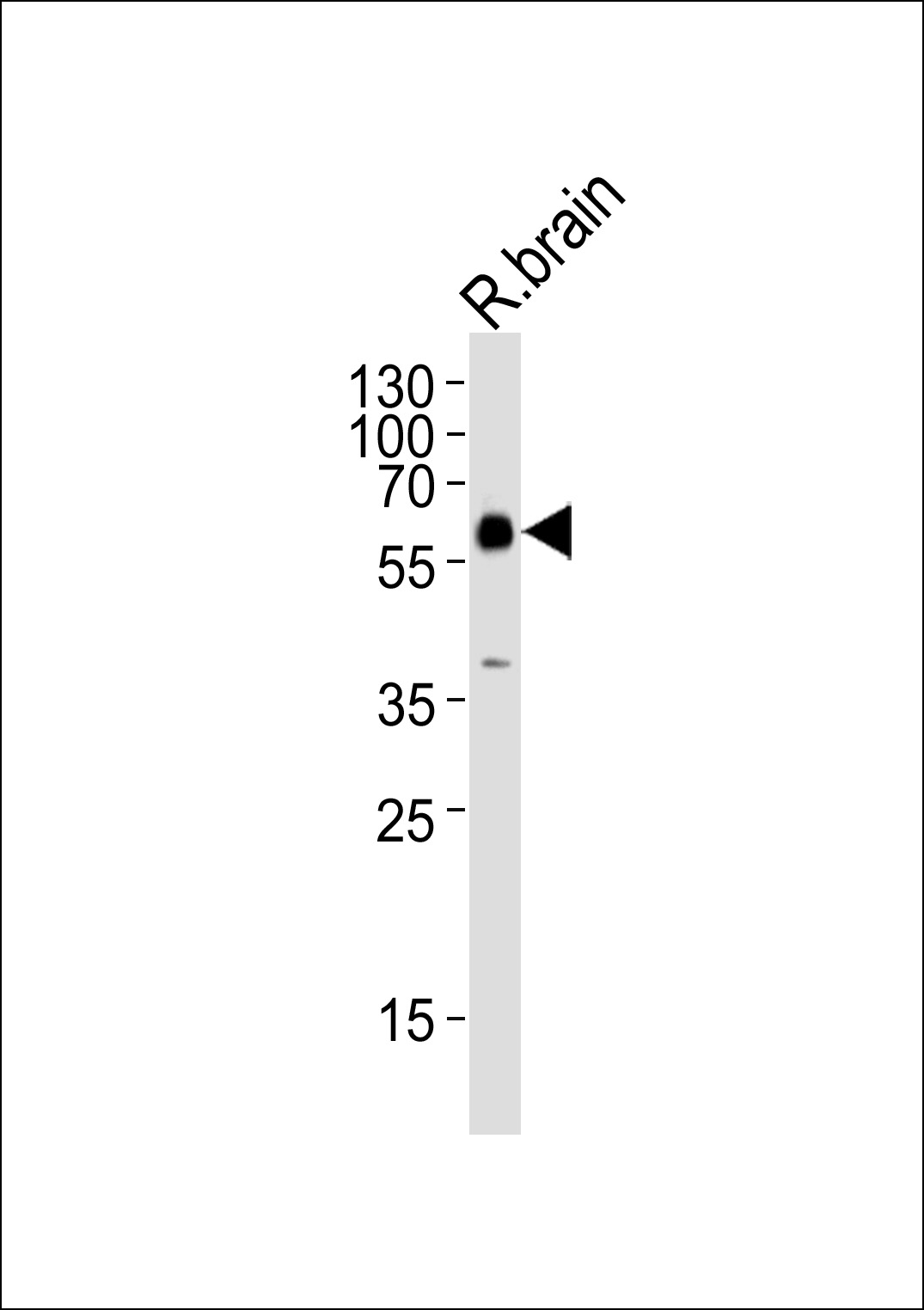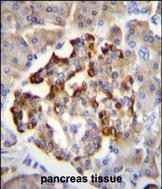GAD2 Antibody (Center)
Affinity Purified Rabbit Polyclonal Antibody (Pab)
- SPECIFICATION
- CITATIONS: 1
- PROTOCOLS
- BACKGROUND

Application
| WB, IHC-P, IF, E |
|---|---|
| Primary Accession | Q05329 |
| Other Accession | Q05683, P48321, P48320, NP_001127838.1, NP_000809.1 |
| Reactivity | Human |
| Predicted | Mouse, Pig, Rat |
| Host | Rabbit |
| Clonality | Polyclonal |
| Isotype | Rabbit IgG |
| Calculated MW | 65411 Da |
| Antigen Region | 109-138 aa |
| Gene ID | 2572 |
|---|---|
| Other Names | Glutamate decarboxylase 2, 65 kDa glutamic acid decarboxylase, GAD-65, Glutamate decarboxylase 65 kDa isoform, GAD2, GAD65 |
| Target/Specificity | This GAD2 antibody is generated from rabbits immunized with a KLH conjugated synthetic peptide between 109-138 amino acids from the Central region of human GAD2. |
| Dilution | IF~~1:10~50 WB~~1:1000 IHC-P~~1:50~100 |
| Format | Purified polyclonal antibody supplied in PBS with 0.09% (W/V) sodium azide. This antibody is purified through a protein A column, followed by peptide affinity purification. |
| Storage | Maintain refrigerated at 2-8°C for up to 2 weeks. For long term storage store at -20°C in small aliquots to prevent freeze-thaw cycles. |
| Precautions | GAD2 Antibody (Center) is for research use only and not for use in diagnostic or therapeutic procedures. |
| Name | GAD2 (HGNC:4093) |
|---|---|
| Synonyms | GAD65 |
| Function | Catalyzes the production of GABA. |
| Cellular Location | Cytoplasm, cytosol. Cytoplasmic vesicle. Presynaptic cell membrane; Lipid-anchor. Golgi apparatus membrane; Peripheral membrane protein; Cytoplasmic side. Note=Associated to cytoplasmic vesicles In neurons, cytosolic leaflet of Golgi membranes and presynaptic clusters |

Provided below are standard protocols that you may find useful for product applications.
Background
This gene encodes one of several forms of glutamic acid decarboxylase, identified as a major autoantigen in insulin-dependent diabetes. The enzyme encoded is responsible for catalyzing the production of gamma-aminobutyric acid from L-glutamic acid. A pathogenic role for this enzyme has been identified in the human pancreas since it has been identified as an autoantibody and an autoreactive T cell target in insulin-dependent diabetes. This gene may also play a role in the stiff man syndrome. Alternative splicing results in multiple transcript variants that encode the same protein.
References
Bailey, S.D., et al. Diabetes Care 33(10):2250-2253(2010)
Jia, P., et al. Schizophr. Res. 122 (1-3), 38-42 (2010) :
Ruano, G., et al. Pharmacogenomics 11(7):959-971(2010)
Pinheiro, A.P., et al. Am. J. Med. Genet. B Neuropsychiatr. Genet. 153B (5), 1070-1080 (2010) :
Jugessur, A., et al. PLoS ONE 5 (7), E11493 (2010) :
If you have used an Abcepta product and would like to share how it has performed, please click on the "Submit Review" button and provide the requested information. Our staff will examine and post your review and contact you if needed.
If you have any additional inquiries please email technical services at tech@abcepta.com.















 Foundational characteristics of cancer include proliferation, angiogenesis, migration, evasion of apoptosis, and cellular immortality. Find key markers for these cellular processes and antibodies to detect them.
Foundational characteristics of cancer include proliferation, angiogenesis, migration, evasion of apoptosis, and cellular immortality. Find key markers for these cellular processes and antibodies to detect them. The SUMOplot™ Analysis Program predicts and scores sumoylation sites in your protein. SUMOylation is a post-translational modification involved in various cellular processes, such as nuclear-cytosolic transport, transcriptional regulation, apoptosis, protein stability, response to stress, and progression through the cell cycle.
The SUMOplot™ Analysis Program predicts and scores sumoylation sites in your protein. SUMOylation is a post-translational modification involved in various cellular processes, such as nuclear-cytosolic transport, transcriptional regulation, apoptosis, protein stability, response to stress, and progression through the cell cycle. The Autophagy Receptor Motif Plotter predicts and scores autophagy receptor binding sites in your protein. Identifying proteins connected to this pathway is critical to understanding the role of autophagy in physiological as well as pathological processes such as development, differentiation, neurodegenerative diseases, stress, infection, and cancer.
The Autophagy Receptor Motif Plotter predicts and scores autophagy receptor binding sites in your protein. Identifying proteins connected to this pathway is critical to understanding the role of autophagy in physiological as well as pathological processes such as development, differentiation, neurodegenerative diseases, stress, infection, and cancer.




